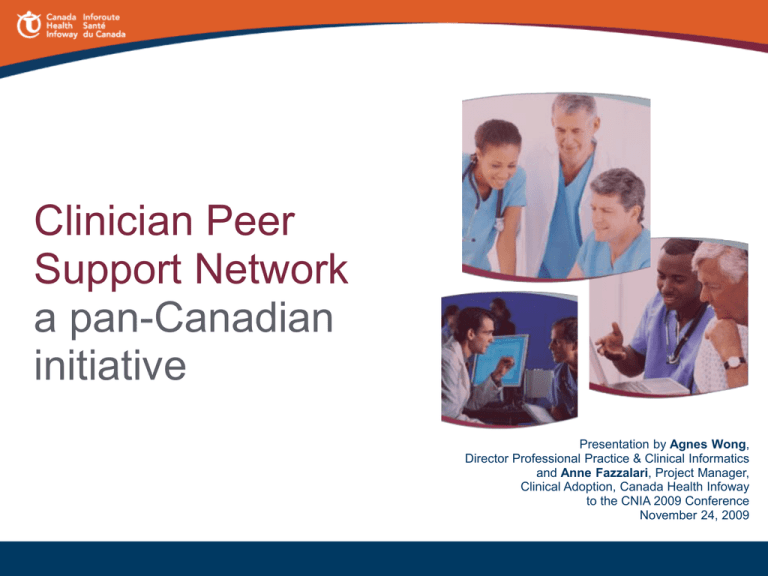Wong_Fazzalari_Nov_24 - Canadian Journal of Nursing
advertisement

Clinician Peer Support Network a pan-Canadian initiative Presentation by Agnes Wong, Director Professional Practice & Clinical Informatics and Anne Fazzalari, Project Manager, Clinical Adoption, Canada Health Infoway to the CNIA 2009 Conference November 24, 2009 Presentation overview • Canada Health Infoway • The Clinical Adoption Team • The Clinician Peer Support Network (Peer Network) o o o A pan-Canadian and regional perspective Findings to date Collaborative Engagement The Clinical Adoption Forum The Peer Network Online Forum About Infoway Canada Health Infoway • Created in 2001 • $1.6 billion in federal funding o An additional $500 million allocated in 2009 Federal Budget • Independent, not-for-profit corporation • Accountable to 14 federal/provincial/territorial governments Mission: Fostering and accelerating the development and adoption of electronic health information systems with compatible standards and communications technologies on a pan-Canadian basis with tangible benefits to Canadians. Infoway will build on existing initiatives and pursue collaborative relationships in pursuit of its mission. Infoway business strategies • • • • • Participate in health care renewal Collaborate with our partners Target the investments Support solution deployment Promote solution adoption and benefits realization The clinical adoption team • Infoway’s Strategic Business foci: Promote solution adoption and benefits realization What do we do: • Provide national and regional leadership and support our investment programs and mandates of our regional teams by accelerating the adoption of EHR solutions by key stakeholders, facilitating clinical leadership, advancing best practices in the clinician adoption of solutions, as well as support the measurement and realization of benefits. o Knowledge Management o Change Management o Benefit Realization o Clinical Adoption The vision for health care A high quality, sustainable and effective Canadian health care system supported by an infostructure that provides residents of Canada and their health care providers timely, appropriate and secure access to the right information when and where they enter into the health care system. Respect for privacy is fundamental to this vision. Points of care and electronic health record Homecare Clinic Emergency Services Community Care Centre Pharmacy Laboratory Specialist Clinic Hospital Emergency Diagnostic Clinician Peer Support Network Background – Peer Network End User Strategy comprised of 3 key objectives: 1. To directly and positively contribute to the acceleration of the adoption of the electronic health record and to benefits realization 2. To accelerate the use of electronic health record solutions by health providers (physicians, pharmacists and nurses) within the practice settings 3. To add value to jurisdictional plans and to support efforts by creating a body of knowledge, lesson learned, leading practices Why peer networks? Integrating technology into practice… Professional Practice Health Informatics ePractice This is truly a transformative change and paradigm shift! National Peer Network framework Western and Territories Region Regional Peer Network Regional Peer Network Atlantic Region Quebec Region Regional Peer Network Regional Peer Network Ontario Region Example of regional Peer Network Western Regional Peer Network B.C. Peer Network Manitoba Peer Network Physicians Nurses Alberta Peer Network Pharmacists Saskatchewan Peer Network Other care Providers Model of National Network Total Peer Leaders: 264 National composition of Peer Leaders 33 Others, 13% 15 Pharmacists, 6% 51 Nurses, 19% 165 Physicians, 62% Total Peer Leaders: 264 Type of clinical settings • Public health • Primary care o Solo practice o Interdisciplinary family practice clinics • Acute care • Community / home care • Long-term care Type of activities • Education, support & consultation 1:1 coaching and mentoring, workshops, eLearning, demonstration and on-site support o facilitating best practices re: workflow integration, policy development, project planning o • Developing education tools and resources • Champions o o o o advocating the use of technology into practice participating at conferences liaising with professional & academic associations submitting articles to journals Hours of activities • Various from network-to-network depending on the size, nature and type of activities • Average of one week of Peer Leader activity per month within a jurisdiction Findings to date What worked well • Dynamic Peer Leaders • Sharing personal experience, one-on-one (e.g. in person or via WebEx session) • Dedicating time to prepare for engagement • Sharing values & benefits • Having knowledge/context prior to Peer Leader session • Respecting busy schedules – reminder call • Using standardized checklist to review with the peers Challenges • Balancing patient care duties & Peer Leader role • Formal opportunities to discuss issues with other Peer Leaders • Scheduling Peer engagements • Clarity regarding Peer Leaders’ roles, responsibilities, and expectations • Knowledge in other EMR systems • Using EMR to its full potential What can make it easier • Additional Peer Leader training and workshops • More resource materials and on-line support so leaders can be more self-prepared • Scheduling convenient times for Peer sessions (e.g. Fridays or evenings) • Have Peer Leader on-site during/around go live • Knowledge and involvement of jurisdictional strategies • Participate in conferences to advocate the Program • Use different venues, e.g. facebook, Asklepios (CMA) Emerging Observations 8 leaders reached out 50 – 100 peers through 1:1 interactions or conferences “I have been involved with [vendor system] since my days at an acute care hospital in the 1980s and I still am writing in a paper chart” (Peer Network Launch Workshop Participant) “When I came last year, I only understood 50% of the information – this year, I’ve understand 90% of what’s being discussed!” (Peer Network Launch Workshop Participant) Peer program accredited by the College of Family Physicians of Canada, Jurisdictional Pharmacy Board Clinical adoption is a journey – Be persistent Collaborative Engagement The Clinical Adoption Forum • Took place on November 3, 2009 • 60+ participants including peer leaders, change management specialists, project sponsors, and project teams • Great success through interactive activities and discussions • Lots of success stories, common themes • Each participants left with a list of action items • Further forum pending The Clinician Peer Support Network Forum • Mandate: o supports sharing and leveraging of knowledge and expertise across Canada to accelerate EHR and EMR implementations and clinical adoption. • Project and clinical resource materials are contributed by jurisdictions and Infoway. Forum stakeholders include clinicians, peer leaders, jurisdiction sponsors and project team members. • Accessing the Center: o o http://forums.infoway-inforoute.ca/CESN More info? peernetwork@infoway-inforoute.ca Infoway passport Home page Announcement Next steps Next steps • Continue Peer Leader Survey (implementation & analysis) • Continue to prepare and share Peer Network quarterly snapshot (regional and pan-Canadian) • Enrich resources/materials in the Peer Network Forum • Continue with Western Regional Collaborative meetings and initiate Atlantic Regional Network Contact information • For more information on the Clinician Peer Support Network: o o Contact: peernetwork@infoway-inforoute.ca / 416-595-3449 ext. 3063 Online: www.infoway-inforoute.ca Thank you





